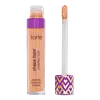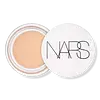What's inside
What's inside
 Key Ingredients
Key Ingredients

 Benefits
Benefits

 Concerns
Concerns

 Ingredients Side-by-side
Ingredients Side-by-side

Water
Skin ConditioningDimethicone
EmollientPropanediol
SolventTrimethylsiloxysilicate
EmollientIsododecane
EmollientGlycerin
HumectantCetyl PEG/PPG-10/1 Dimethicone
EmulsifyingPhenyl Trimethicone
Skin ConditioningPEG-10 Dimethicone
Skin ConditioningTriethoxycaprylylsilane
Aluminum Starch Octenylsuccinate
AbsorbentPolyglyceryl-3 Diisostearate
EmulsifyingPolypropylene
Phenoxyethanol
PreservativeDisteardimonium Hectorite
StabilisingHydrogenated Polyisobutene
EmollientMagnesium Sulfate
Sorbitan Sesquiisostearate
EmulsifyingSodium Chloride
MaskingPropylene Carbonate
SolventPolysilicone-11
Ethylhexylglycerin
Skin ConditioningButyrospermum Parkii Butter
Skin ConditioningKaolin
AbrasiveSqualane
EmollientTocopheryl Acetate
AntioxidantMangifera Indica Seed Butter
Skin ConditioningPentaerythrityl Tetra-Di-T-Butyl Hydroxyhydrocinnamate
AntioxidantTocopherol
AntioxidantCentella Asiatica Extract
CleansingGlycyrrhiza Glabra Root Extract
BleachingOpuntia Vulgaris Extract
Skin ConditioningPanax Ginseng Root Extract
EmollientSodium Hyaluronate
HumectantCitric Acid
BufferingSodium Ferrocyanide
Chromium Oxide Greens
Iron Oxides
Water, Dimethicone, Propanediol, Trimethylsiloxysilicate, Isododecane, Glycerin, Cetyl PEG/PPG-10/1 Dimethicone, Phenyl Trimethicone, PEG-10 Dimethicone, Triethoxycaprylylsilane, Aluminum Starch Octenylsuccinate, Polyglyceryl-3 Diisostearate, Polypropylene, Phenoxyethanol, Disteardimonium Hectorite, Hydrogenated Polyisobutene, Magnesium Sulfate, Sorbitan Sesquiisostearate, Sodium Chloride, Propylene Carbonate, Polysilicone-11, Ethylhexylglycerin, Butyrospermum Parkii Butter, Kaolin, Squalane, Tocopheryl Acetate, Mangifera Indica Seed Butter, Pentaerythrityl Tetra-Di-T-Butyl Hydroxyhydrocinnamate, Tocopherol, Centella Asiatica Extract, Glycyrrhiza Glabra Root Extract, Opuntia Vulgaris Extract, Panax Ginseng Root Extract, Sodium Hyaluronate, Citric Acid, Sodium Ferrocyanide, Chromium Oxide Greens, Iron Oxides
Polyglyceryl-2 Triisostearate
EmulsifyingOctyldodecanol
EmollientKaolin
AbrasivePolybutene
Mica
Cosmetic ColorantPolyethylene
AbrasiveCaprylic/Capric Triglyceride
MaskingBidens Pilosa Extract
HumectantIsopropyl Titanium Triisostearate
EmollientStearalkonium Hectorite
Gel FormingPropylene Carbonate
SolventAstrocaryum Murumuru Seed Butter
EmollientGossypium Herbaceum Seed Oil
Skin ConditioningLinum Usitatissimum Seed Oil
PerfumingTocopherol
AntioxidantTrihydroxystearin
Skin ConditioningEthylhexyl Palmitate
EmollientSilica Dimethyl Silylate
EmollientButylene Glycol
HumectantSodium Hyaluronate
HumectantCaprylyl Glycol
EmollientHexylene Glycol
EmulsifyingTocopheryl Acetate
AntioxidantLecithin
EmollientPhenoxyethanol
PreservativeCI 77163
Cosmetic ColorantIron Oxides
CI 77891
Cosmetic ColorantPolyglyceryl-2 Triisostearate, Octyldodecanol, Kaolin, Polybutene, Mica, Polyethylene, Caprylic/Capric Triglyceride, Bidens Pilosa Extract, Isopropyl Titanium Triisostearate, Stearalkonium Hectorite, Propylene Carbonate, Astrocaryum Murumuru Seed Butter, Gossypium Herbaceum Seed Oil, Linum Usitatissimum Seed Oil, Tocopherol, Trihydroxystearin, Ethylhexyl Palmitate, Silica Dimethyl Silylate, Butylene Glycol, Sodium Hyaluronate, Caprylyl Glycol, Hexylene Glycol, Tocopheryl Acetate, Lecithin, Phenoxyethanol, CI 77163, Iron Oxides, CI 77891
Ingredients Explained
These ingredients are found in both products.
Ingredients higher up in an ingredient list are typically present in a larger amount.
Kaolin is a clay. It is used for oil control and to help minimize pores. Like other clays, kaolin has the ability to absorb excess sebum or oil. This can help clean out pores and mattify the skin.
Some types of kaolin may have exfoliating properties. When water is added to kaolin, it becomes a paste with small abrasive particles.
Most kaolin is a white color, but may be pink/orange/red depending on where it comes from.
The name 'kaolin' comes from a Chinese village named 'Gaoling'. Kaolin clay comes from rocks rich in kaolinite. Kaolinite, the mineral, has a silicate layered structure. Kaolinite is formed from chemical weathering of aluminum siilicate minerals.
Besides skincare, kaolin is commonly used to make glossy paper, in ceramics, toothpaste, and as medicine to soothe stomach issues.
Learn more about KaolinPhenoxyethanol is a preservative that has germicide, antimicrobial, and aromatic properties. Studies show that phenoxyethanol can prevent microbial growth. By itself, it has a scent that is similar to that of a rose.
It's often used in formulations along with Caprylyl Glycol to preserve the shelf life of products.
This ingredient is a solvent. It helps dissolve active ingredients and alter the texture of products.
Propylene Carbonate is commonly used in makeup and with clay, such as montmorillonite or bentonite.
Studies show this ingredient to be safe for cosmetics. When it is undiluted, it can cause skin irritation. (It is always diluted in skincare and makeup). This ingredient is water-soluble.
Propylene Carbonate is created from propylene glycol and carbonic acid.
Learn more about Propylene CarbonateSodium Hyaluronate is hyaluronic acid's salt form. It is commonly derived from the sodium salt of hyaluronic acid.
Like hyaluronic acid, it is great at holding water and acts as a humectant. This makes it a great skin hydrating ingredient.
Sodium Hyaluronate is naturally occurring in our bodies and is mostly found in eye fluid and joints.
These are some other common types of Hyaluronic Acid:
Learn more about Sodium HyaluronateTocopherol (also known as Vitamin E) is a common antioxidant used to help protect the skin from free-radicals and strengthen the skin barrier. It's also fat soluble - this means our skin is great at absorbing it.
Vitamin E also helps keep your natural skin lipids healthy. Your lipid skin barrier naturally consists of lipids, ceramides, and fatty acids. Vitamin E offers extra protection for your skin’s lipid barrier, keeping your skin healthy and nourished.
Another benefit is a bit of UV protection. Vitamin E helps reduce the damage caused by UVB rays. (It should not replace your sunscreen). Combining it with Vitamin C can decrease sunburned cells and hyperpigmentation after UV exposure.
You might have noticed Vitamin E + C often paired together. This is because it is great at stabilizing Vitamin C. Using the two together helps increase the effectiveness of both ingredients.
There are often claims that Vitamin E can reduce/prevent scarring, but these claims haven't been confirmed by scientific research.
Learn more about TocopherolTocopheryl Acetate is AKA Vitamin E. It is an antioxidant and protects your skin from free radicals. Free radicals damage the skin by breaking down collagen.
One study found using Tocopheryl Acetate with Vitamin C decreased the number of sunburned cells.
Tocopheryl Acetate is commonly found in both skincare and dietary supplements.
Learn more about Tocopheryl AcetateThis ingredient is a combination of red, black, and yellow iron oxide pigments. This combination of colors is usually found in foundation, because it results in a "skin" color.